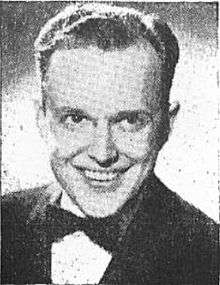Will Bradley
| Will Bradley | |
|---|---|
 Will Bradley in a 1942 advertisement | |
| Background information | |
| Birth name | Wilbur Schwichtenberg |
| Born |
July 12, 1912 Newton, New Jersey, U.S. |
| Died |
July 15, 1989 Flemington, New Jersey |
| Genres | Big band, boogie-woogie |
| Occupation(s) | Musician |
| Instruments | Trombone |
Wilbur Schwichtenberg (July 12, 1912 – July 15, 1989)[1], known professionally as Will Bradley, was an American trombonist and bandleader during the 1930s and 1940s. He performed swing, dance music, and boogie-woogie songs, many of them written by Don Raye.
Career
Born in Newton, New Jersey, Bradley was raised in Washington, New Jersey.[2] In 1928, he moved to New York City and became a member of bands such as Red Nichols & His Five Pennies. During the 1930s, he was a studio musician for CBS except for one year with the Ray Noble orchestra.[3]
In 1939 he started a big band with Ray McKinley[2], a swing drummer and vocalist from Texas, and changed his name from Schwictenberg to Will Bradley. The band included Freddie Slack, Arthur Rollini, Peanuts Hucko, Lee Castle, and Pete Candoli. Vocalists included Terry Allen, Carlotta Dale, Lynn Gardner, Steve Jordan, Ray McKinley, Phyllis Myles, Larry Southern, and Jimmy Valentine.[3]
The Bradley band became well known for boogie-woogie, particularly its hit record, "Beat Me Daddy, Eight to the Bar".[4] The song reached the top ten of Billboard magazine's popular music chart, as did "Scrub Me Mama with a Boogie Beat" and "Down the Road a Piece". The latter song was recorded by the Will Bradley Trio, consisting of McKinley, Slack, and Doc Goldberg, with guest vocals by songwriter Don Raye.
In 1942, McKinley departed to form his own band. Bradley hired trumpeter Shorty Rogers and drummer Shelly Manne, but many members wound up in the military due to the draft, and the band dissolved. For the rest of his music career, Bradley composed chamber music and orchestral works.[3]
Bradley was one of the first band leaders to appear in soundies, three-minute musical films made for coin-operated "movie jukeboxes." His films, made in late 1940, were widely distributed and gave his band valuable exposure. Drummer Ray McKinley sang most of the vocals.
Death
He died on July 15, 1989, in Flemington, New Jersey, three days after his 77th birthday
Radio
Bradley was the band leader for the Summer Silver Theater on CBS in 1941, with Ed Sullivan as the show's host.[5]
Discography
- Boogie-Woogie (Epic, 1954)
- Jazz Encounter (Waldorf Music Hall, 1955)
- Jazz – Dixieland and Chicago Style (Waldorf Music Hall, 1955)
- 1941 (Circle, 1986)[6]
With Ruth Brown
- Ruth Brown (Atlantic, 1957)
With Charlie Parker
References
- ↑ Joseph F. Clarke (1977). Pseudonyms. BCA. p. 26.
- 1 2 Feather, Leonard; Gitler, Ira (2007). The Biographical Encyclopedia of Jazz. Oxford University Press, US. p. 78. ISBN 9780195320008. Retrieved 28 March 2017.
- 1 2 3 arwulf, arwulf. "Will Bradley". AllMusic. Retrieved 26 June 2017.
- ↑ "Will Bradley, 78, Dies; Wrote Boogie-Woogie". The New York Times. 19 July 1989. Retrieved 26 June 2017.
- ↑ "Sunday". Radio and Television Mirror. 16 (5): 41. September 1941. Retrieved 1 April 2015.
- ↑ "Will Bradley And His Orchestra". Discogs. Retrieved 26 June 2017.